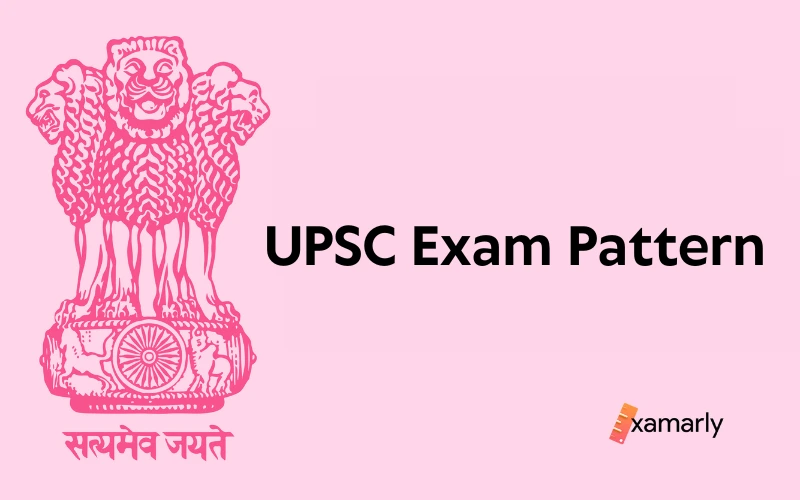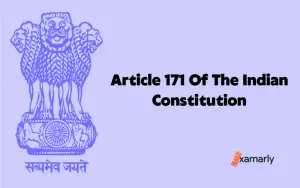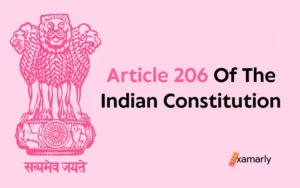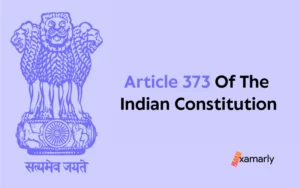Do you want a clear understanding of the UPSC exam pattern? The Union Public Service Commission (UPSC) Civil Services Examination is one of the most prestigious and competitive exams in India, and it requires a thorough understanding of the UPSC Exam Pattern.
The examination consists of two stages, the Preliminary and the Main, each testing the candidate’s aptitude, knowledge, and personality in different ways.
The pattern of the exam, including the number of papers, their format, and the negative marking scheme, plays a crucial role in determining the outcome of the examination.
In this article, we will take an in-depth look at the UPSC Exam Pattern, helping aspirants understand the structure and nature of the examination, and better prepare for their journey to become civil servants.
- UPSC Exam Pattern for UPSC CSE 2023
- 2023 UPSC Prelims Exam Format & Negative Marking Policy
- UPSC Mains 2023 Exam Pattern
- Detailed Information
- Paper B
- Paper I – Essay
- Paper II – General Studies 1
- Paper III – General Studies 2
- Paper IV – General Studies 3
- Paper V – General Studies 4
- Paper VI & VII
- UPSC CSE 2023 Personality/Interview Test Pattern
- Points To Remember
- Conclusion
- Frequently Asked Questions
- What is the format of the UPSC exam?
- How many papers are there in the UPSC main exam?
- What is the marking scheme of the UPSC exam?
- Is there any age limit for appearing in the UPSC exam?
- How many attempts are allowed for the UPSC exam?
- What is the syllabus for UPSC preliminary exam?
- How many times a year UPSC exam is conducted?
- What is the duration of the UPSC mains exam?
- Is there any minimum percentage required to appear in the UPSC exam?
- How many questions are asked in UPSC preliminary exam?
UPSC Exam Pattern for UPSC CSE 2023
The pattern of the UPSC Civil Services Exam (CSE) 2023 is as follows:
Preliminary Exam:
- Two objective papers: General Studies Paper 1 and General Studies Paper 2 (CSAT).
- The scores obtained in the Preliminary Exam are only considered for determining eligibility for the Main Exam, and not for determining the final ranking.
Main Exam:
- The Main Exam consists of nine papers, two qualifying and seven others for ranking.
- The seven papers for ranking include:
- Essay
- General Studies Paper 1
- General Studies Paper 2
- General Studies Paper 3
- General Studies Paper 4
- Optional Paper 1
- Optional Paper 2
Interview:
- Those who successfully pass the Main Exam will be invited for an interview.
- The marks obtained in the interview are added to the Main Exam marks to determine the final ranking.
Note: The above pattern is subject to change and the official notification for UPSC CSE 2023 exam pattern will be released by the UPSC in due course.
Important:
- Blind candidates are eligible for extra time in the examination as per their needs, usually 50% more time than the normal duration.
- They can also avail of the assistance of a writer or a reader, as per their requirement.
- The examination centres are equipped with facilities such as Braille and audio-enabled question papers.
2023 UPSC Prelims Exam Format & Negative Marking Policy
The format of the UPSC Civil Services Exam (CSE) 2023 Preliminary Exam is objective-type, consisting of two papers: General Studies Paper 1 and General Studies Paper 2 (CSAT). The marks obtained in the Preliminary Exam are only considered for determining eligibility for the Main Exam and not for determining the final ranking.
Regarding the negative marking policy, a penalty of deducting one-third of the marks allotted to each question will be imposed for every incorrect answer.
The negative marking policy is in place to discourage wild guesses and encourage more thoughtful and informed answering. However, it is important to note that the actual negative marking policy for UPSC CSE 2023 may change and the official notification will be released by the UPSC in due course.
Read More: 6 Effectual Cue To Avoid Negative Marking In UPSC Prelims
All About UPSC Preliminary Examination
Besides the IAS exam pattern, some more instructive pieces of information regarding the UPSC prelims exam are discussed below:
- UPSC Civil Services Prelims comprise two question papers namely – GS-1 and GS-2 (i.e. CSAT)and are conducted on the same day.
- Both papers are objective. This means objective-type questions come in the first phase of the UPSC Civil Services Examination.
- CSAT(Civil Services Aptitude Test) is a qualifying paper for UPSC. This means you have to score the minimum qualifying marks i.e. 33% marks or 66 marks in the second paper of UPSC Prelims to be eligible for the first paper GS-1 to be checked.
- Marks scored in the GS-1 paper are not considered in the final merit list. This mark is only for the cut-off in the first stage that gives you an entry to the second stage of UPSC.
- Negative marking for incorrect answers plays a key role in both the UPSC Prelims Paper. For every wrong answer, a candidate is awarded 1/3rd ( of the marks assigned to that question) negative marks as a penalty.
General Studies Paper I
General Studies Paper 1 in the UPSC Civil Services Preliminary Exam is one of the two compulsory papers in the exam. It tests the candidate’s understanding of current affairs and general knowledge in various areas including:
- Indian heritage and culture, history, and geography
- World geography and events
- The Indian political system and governance, encompassing the Constitution, political setup, local self-governance through Panchayati Raj, and public policy initiatives.
- Development of the economy and society, sustainability, population characteristics, and programs in the social sector.
- General issues on environmental ecology
General Studies Paper II(CSAT)
General Studies Paper II, also known as the Civil Services Aptitude Test (CSAT), is the second compulsory paper in the UPSC Civil Services Preliminary Exam. It assesses the candidate’s aptitude and skills, rather than knowledge-based information, in the following areas:
- Comprehension: the ability to understand written text and draw inferences from it
- Interpersonal skills including communication skills
- Logical reasoning and analytical ability
- Decision-making and problem-solving
- Basic numeracy (numbers and their relations, orders of magnitude, etc.)
- Data interpretation (charts, graphs, tables, data sufficiency etc.)
The CSAT paper is designed to assess the candidate’s ability to think critically and make judgments, as well as their aptitude for a career in the Indian Administrative Service.
UPSC Mains 2023 Exam Pattern
The Main Exam consists of nine papers, Indian language, English, essay, general and optional papers. Everything is a descriptive paper. This pattern includes two qualifying papers and seven others for ranking. The papers are:
- Qualifying Papers:
- Paper A (to be selected from the languages listed in the Eighth Schedule of the Constitution of India)
- Paper B (English)
- Papers for ranking:
- Essay
- General Studies Paper 1
- General Studies Paper 2
- General Studies Paper 3
- General Studies Paper 4
- Optional Paper 1
- Optional Paper 2
The papers for ranking (3 to 9) are evaluated to determine the final rank of the candidates. The marks obtained in the Main Exam and the interview are combined to determine the final ranking.
Note: The above pattern is subject to change and the official notification for the UPSC CSE 2023 Main Exam pattern will be released by the UPSC in due course.
Detailed Information
- Essay Paper – 250 marks
- General Studies I (Indian Heritage and Culture, History, and Geography) – 250 marks
- General Studies Paper II (covering topics such as Governance, Constitution, Political System, Social Justice, and International Relations) – 250 marks.
- General Studies Paper III (including subjects like Technology, Economic Growth, Biodiversity, Environmental Issues, Security and Disaster Management) – 250 marks.
- General Studies IV (Ethics, Integrity, and Aptitude) – 250 marks
- Optional Subject Paper I & optional subject paper II – 250+250
- Language Paper (English or any Indian language included in the 8th Schedule of the Constitution) – 300 marks
- Interview – 275 marks
The total marks of the Main Exam are 1750 and that of the entire examination is 2025 (Preliminary Exam: 400 + Main Exam: 1750 + Interview: 275). The final merit list is prepared based on the combined score of the Main Exam and the Interview.
Paper B
Paper I – Essay
Paper I of the Main Exam in the UPSC Civil Services Examination (CSE) is “Essay Paper.” The Essay Paper is also an English paper that tests a candidate’s writing and comprehension skills, as well as their ability to express their thoughts and ideas clearly and effectively.
The paper consists of six essay topics and candidates have to choose any one of them. The duration of the paper is 3 hours and it is worth 250 marks.
The objective of the Essay Paper is to assess the candidate’s ability to present a clear and well-structured argument, demonstrate an understanding of the subject matter, and express their thoughts and ideas logically and coherently.
The questions are usually based on current national and international events, political and economic issues, and social and cultural trends.
In the Essay Paper, it is important for candidates to write clear, concise, and grammatically correct English, and to structure their essays logically and coherently. Additionally, they should also strive to demonstrate an understanding of the subject matter and to present their arguments persuasively.
Paper II – General Studies 1
Paper II of the Main Exam in the UPSC Civil Services Examination (CSE) is “General Studies I.” The paper covers the following subjects: Indian Heritage and Culture, History, and Geography.
The paper is designed to test a candidate’s knowledge of Indian history, culture, geography, and other related subjects. It is worth 250 marks and the duration of the paper is 3 hours.
In General Studies I, candidates are tested on their knowledge of Indian heritage and culture, including art, literature, and architecture.
They are also tested on their knowledge of Indian history, including ancient, medieval, and modern history, and their understanding of the political, economic, and social developments that have taken place in India.
Additionally, candidates are also tested on their knowledge of geography, including physical geography, climatology, and geology.
In this paper, candidates need to have a broad understanding of the subject matter, as well as an ability to analyze and interpret historical and geographical data. Candidates should also be able to relate the information they have learned to current events and trends in Indian society and politics.
Paper III – General Studies 2
Paper III of the Main Exam in the UPSC Civil Services Examination (CSE) is “General Studies II.” The paper covers the following subjects: Governance, Constitution, Polity, Social Justice, and International challenges. The paper is worth 250 marks and the duration is 3 hours.
The objective of General Studies II is to test a candidate’s knowledge and understanding of India’s political and administrative systems, including the Constitution, significant aspects of governance, and social justice. Candidates are also tested on their knowledge of international relations and global events and issues.
Candidates should be able to answer Union and state’s responsibilities such as devolution of powers, federal structure etc. Knowledge about the separation of Powers Among Different Bodies, Dispute Resolution Mechanisms, and Institutions is important.
In this paper, candidates should have a comprehensive understanding of the functioning of India’s democratic system, and welfare schemes including the role of the judiciary, legislature, and executive.
They should also have a good understanding of the Constitution including its provisions and amendments, and be able to analyze the various issues related to governance, social justice, and international relations.
It is important for candidates to have a broad knowledge of current national and international political and economic events and to be able to analyze and interpret these events in the context of India’s political and administrative systems.
Additionally, candidates should also be able to express their thoughts and ideas clearly and effectively.
Paper IV – General Studies 3
Paper IV of the Main Exam in the UPSC Civil Services Examination (CSE) is “General Studies III.” The paper covers the following subjects: Technology, Economic Development, Bio-diversity, Environment, Security, and Disaster Management. The paper is worth 250 marks and the duration is 3 hours.
The objective of General Studies III is to test a candidate’s knowledge and understanding of the various scientific, technological, and economic developments, and industrial growth that is shaping the world today.
Candidates are also tested on their knowledge of environmental issues, including biodiversity and climate change, as well as on their understanding of security and disaster management.
In this paper, candidates should have a good understanding of the latest scientific and technological advancements, as well as their potential impact on society and the economy. Indian Accomplishments in Science & Technology, including the Indigenization of Technology.
They should also have a broad understanding of the key environmental and internal security challenges facing the world today, and be able to analyze and interpret these challenges in a meaningful and informed manner.
It is important for candidates to be well-informed about current national and international economic and technological developments, and to be able to analyze and interpret these developments in the context of India’s economic growth and development.
Additionally, candidates should also be able to express their thoughts and ideas clearly and effectively and to present their arguments persuasively and logically.
Read More: How To Prepare Economics For UPSC: A Comprehensive Guide
Paper V – General Studies 4
Paper V of the Main Exam in the UPSC Civil Services Examination (CSE) is “General Studies IV.” The paper covers the following subjects: Ethics, Integrity, and Aptitude. The paper is worth 250 marks and the duration is 3 hours. Also, candidates will be analyzed for civil service values.
The objective of General Studies IV is to test a candidate’s ethical and moral values, integrity, and aptitude for public service. The paper aims to evaluate a candidate’s character, temperament, and ability to make decisions fairly and impartially.
In this paper, candidates are expected to have a sound understanding of ethical and moral principles and to be able to apply these principles to real-life situations. This paper also tests your knowledge about the philosophies of famous moral thinkers.
Candidates should also have a good understanding of the principles of public administration, and be able to analyze ethical dilemmas and ethical issues that may arise in a public service setting.
Candidates need to be able to demonstrate their integrity, honesty, and impartiality, and to show that they have a strong commitment to the quality of service delivery. Additionally, candidates should also be able to express their thoughts and ideas clearly and effectively and to present their arguments persuasively and logically.
General Studies IV is considered to be an important paper in the Main Exam, as it helps the UPSC to assess a candidate’s suitability for a career in public service. A good performance in this paper can go a long way in helping a candidate secure a good rank in the Civil Services Examination and eventually become a successful civil servant.
Read More: Difference Between Ethics And Morals: An Ultimate Guide
Paper VI & VII
UPSC Mains Optional Subjects
For UPSC Mains Paper VI & Paper VII, optional subjects have to be any one of the subjects that are listed below:
- Agriculture Civil Engineering Geology Mechanical Engineering Psychology
- Animal Husbandry and Veterinary Science Commerce and Accountancy History Medical Science Public Administration
- Anthropology Economics Law Philosophy Sociology
- Botany Electrical Engineering Management Physics Statistics
- Chemistry Geography Mathematics Political Science International Relations Zoology
UPSC Mains Optional Subjects Optional For literature subjects are tabulated below:
- Assamese Bengali Bodo Dogri Gujarati Hindi
- Kannada Kashmiri Konkani Maithili Malayalam Manipuri
- Marathi Nepali Odia Punjabi Sanskrit Santhali
- Sindhi Tamil Telugu Urdu English
All About UPSC Mains Examination
- The UPSC Mains Examination is comprised of 9 individual tests and takes place over 5 to 7 days.
- All 9 papers contain descriptive answer-type questions where you have to write the answers in detail which makes this phase an exhaustive one.
- Nature of questions in General Studies paper (Paper II – Paper IV): Candidates will be asked to answer a series of subjective type of questions, which are likely to have relevance to a career in Civil Services. The questions will be designed to test the candidates’ knowledge of all relevant issues and their ability to analyze complex socio-economic situations. They must give relevant, meaningful, and succinct answers. Alternatively, questions are framed in such a manner to test the candidates’ general awareness concerning a variety of subjects.
- For Paper A (Indian Language)– Students have to select an Indian language mentioned in the Eighth Schedule of the Indian Constitution. Paper A, which consists of the Indian language, is not compulsory for candidates from the states of Arunachal Pradesh, Meghalaya, Manipur, Nagaland, Sikkim, and Mizoram.
- For English Language Paper B – Neither Paper A nor Paper B contribute to the final scores or ranking and are only used for qualification purposes. The qualifying marks for each of the papers are 25%.
- Paper I – This essay paper is divided into two sections and each of the sections has 4 topics. A candidate must choose one of the topics and write an essay on the chosen topic. So, in total, one must write two essays in 3 hours.
- Marks scored in UPSC Mains are valuable as they play a key role in the final merit declaration.
Note: Both Paper A and Paper B are of Matriculation/10th level or equivalent standard. The pattern of the question of both papers are mentioned below:
Pattern Of Question: Indian Language: The format of the questions of Paper A is given below:
- Comprehension of given passages
- Precise Writing
- Usage and Vocabulary
- Short Essays
- Translation from English to the Indian Language and vice-versa
Pattern Of Question: English Language: The format of the questions of Paper B is given below:
- Comprehension of given passages
- Precise Writing
- Usage and Vocabulary
- Short Essays
UPSC CSE 2023 Personality/Interview Test Pattern
The pattern of the Personality/Interview process for the UPSC Civil Services Examination (CSE) 2023 is determined by the Union Public Service Commission (UPSC). However, the selection process typically evaluates a candidate’s moral integrity, interpersonal skills, mental, and logical exposition, social cohesion, emotional ability, and overall personality through a face-to-face interview. In this interview, you will also be analyzed for your critical powers.
The test is usually conducted after the written examination and is designed to assess the candidate’s suitability for a career in public service. The interview is usually conducted by a panel of experts appointed by the UPSC and lasts approximately 30-45 minutes.
The questions asked during the interview aim to gauge the candidate’s communication skills, analytical ability, and awareness of contemporary national and international issues. In a nutshell, an interview briefs the candidate’s powers of assimilation, mental abilities and social traits.
Points To Remember
- All the papers of the UPSC Mains Exam can be answered in English or any other language listed in the Eighth Schedule of the Constitution of India, except Paper A and Paper B. Candidates who haven’t answered any papers in English may opt to answer their optional papers in English.
- The English and Indian Language paper must be answered in English and the relevant Indian language, except in cases where the translation is required.
- The UPSC Mains Exam consists of 1750 marks and 275 is the UPSC total marks for the Interview. The UPSC total marks of both UPSC Mains and interview sum up together which makes the total of 2025 marks for the final merit.
- It is required to score at least 25% marks in each paper of UPSC Mains for the final selection.
Conclusion
In conclusion, the UPSC Exam Pattern is designed to test the overall aptitude and knowledge of the candidate. The combination of the Prelims and Mains exams, assesses mental alertness, critical thinking skills, language proficiency, and overall personality.
The qualifying nature of some of the papers and the negative marking scheme add to the challenge of the exam.
However, with proper preparation and a sound understanding of the exam pattern, a candidate can successfully navigate through the test and achieve their goal of serving the nation as a civil servant.
Check Latest Posts:
Difference Between Fascism and Socialism- A Full Guide
Differences Between Gandhism and Marxism
Difference between Cabinet Minister and Minister of State
Difference Between High Commission And Embassy
Frequently Asked Questions
What is the format of the UPSC exam?
The UPSC exam consists of three stages – the preliminary exam, the main exam, and the interview round.
How many papers are there in the UPSC main exam?
The UPSC mains exam includes nine papers, with two qualifying papers and seven papers to be counted for ranking.
What is the marking scheme of the UPSC exam?
The UPSC exam follows a negative marking system with a penalty of 1/3 mark for each incorrect answer.
Is there any age limit for appearing in the UPSC exam?
Yes, the age limit for appearing in the UPSC exam is 32 years for the general category and 37 years for reserved category candidates.
How many attempts are allowed for the UPSC exam?
The number of attempts allowed for the UPSC exam for general category candidates is 6 and 9 for reserved category candidates.
What is the syllabus for UPSC preliminary exam?
The syllabus for UPSC preliminary exam includes topics from Indian politics, economics, history, geography, and general science.
How many times a year UPSC exam is conducted?
The UPSC exam is conducted once a year, typically in June or October.
What is the duration of the UPSC mains exam?
The duration of each paper in the UPSC mains exam is three hours.
Is there any minimum percentage required to appear in the UPSC exam?
No, there is no minimum percentage requirement to appear in the UPSC exam.
How many questions are asked in UPSC preliminary exam?
The UPSC preliminary exam consists of two papers, each containing 100 questions.






